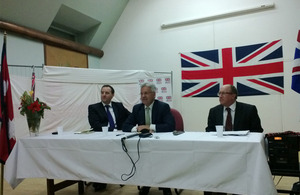Elections are the only way forward
Press Conference Statement by Rt Hon Alan Duncan MP, UK Minister of State for International Development

Rt Hon Alan Duncan MP, UK Minister of State for International Development (centre) flanked by Ambassador Andy Sparkes (right) and DFID Nepal Head Dominic O'Neill
I realise that Nepal’s current government’s main task is to guide the country to elections, but I hope that the Interim Electoral Council will continue with implementing public policies during the transition to elections. This is my fourth visit to this beautiful country. As always, my welcome in Nepal has been fantastic.
Links between our two countries are deep and longstanding – nearly 200 years old. I came to see how UK Aid is helping the poorest and changing lives. I also came to find out about elections preparation.
Yesterday, along with the Nepali Minister for Federal Affairs and Local Development, I inaugurated a bridge across the Shaba Khola in Sankhusabha district. I was elated that the access provided by the bridge will transform so many people’s lives in Eastern Nepal. This is the kind of project I have in mind when we talk about wealth creation – DFID is working to deliver this kind of opportunity across the country. The UK is planning to spend around £100 million between 2011-2015 on creating the opportunities and jobs Nepal needs. Boosting Nepal’s growth rate by just a third would lift an additional 170,000 people out of poverty each year. The UK is committed to helping Nepal make this a reality.
The Rural Access Programme is a very tangible example of how DFID is supporting communities. There are other projects that I am keen to see expand or start up: for example support to give communities access to finance to help them start up their own businesses. I realise that Nepal’s current government’s main task is to guide the country to elections, but I hope that the Interim Electoral Council will continue with implementing public policies during the transition to elections. Maintaining public services and providing the macro-economic steer that only governments can, are essential functions that no other institution can take on.
I spent today seeing political and government leaders including the President, Chairman of the Interim Electoral Council, Foreign Minister and Finance Minister. I applaud those who are committed to ensuring that elections do take place, for elections are the only way forward to the constitutional and political settlement that would benefit Nepal. I stressed the need for quality and inclusion.
I understand that there are some political parties that are in disagreement with the transitional arrangements to guide Nepal to polling day. I had a useful and frank discussion with Mr Baidya. I urged him to agree to participate in elections. I also asked him not to encourage his supporters to disrupt the vote. I offer the same message to other parties withholding their full support for elections: this is the only way forward.
Tomorrow morning I will leave hopeful that Nepal is on the right track, and convinced of the continuing strength of our partnership.